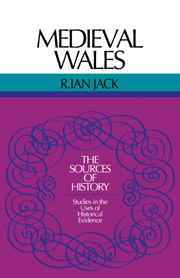Book contents
- Frontmatter
- Contents
- Abbreviations
- General Editor's Introduction
- Preface
- 1 Literary Sources
- 2 The Official Records of Wales and Their Preservation
- 3 The Records of the English Government
- 4 Archives of Individuals and Corporations
- 5 Ecclesiastical Records
- 6 The Antiquaries
- 7 Archaeology and Numismatics
- 8 Cartography and Place-Names
- 9 Conclusion
- Index
- Frontmatter
- Contents
- Abbreviations
- General Editor's Introduction
- Preface
- 1 Literary Sources
- 2 The Official Records of Wales and Their Preservation
- 3 The Records of the English Government
- 4 Archives of Individuals and Corporations
- 5 Ecclesiastical Records
- 6 The Antiquaries
- 7 Archaeology and Numismatics
- 8 Cartography and Place-Names
- 9 Conclusion
- Index
Summary
In 1808 Sir Samuel Meyrick published The History and Antiquities of the County of Cardigan collected from the Few Remaining Documents which have Escaped the Destructive Ravages of Time, as well as from Actual Observation. I have tried, from my actual observation, to collect some information about these scattered evidences of Wales's past. The documents, taken by and large, are not as few as Meyrick feared, but they do survive very unevenly. The outstanding feature of the archival remains is that one topic and one only can be explored in reasonable depth and that topic is the financial administration of the Principality. Everything else survives only in fragments and unsystematic transcripts, but the records of the chamberlains and their officials, and their relations with the English government, survive, poorly enough by the standards of the English Exchequer, but well enough to promote more studies like those of Mr Waters and Mrs Fryde.
This by no means limits, however, the useful and necessary work waiting to be done. I have tried to emphasise throughout this book how studies of charter-forms, of episcopal administration, of marcher lordships, of land-holding and gwelyau, of placenames, of masons' marks, of books owned by Welsh monasteries, of comparisons with Scotland and Ireland and so on, are needed before students of Welsh history have a proper base. And before these secondary studies are done, there is an urgent need for guides and indexes and calendars and union-lists from many repositories.
- Type
- Chapter
- Information
- Medieval Wales , pp. 229 - 234Publisher: Cambridge University PressPrint publication year: 1976



